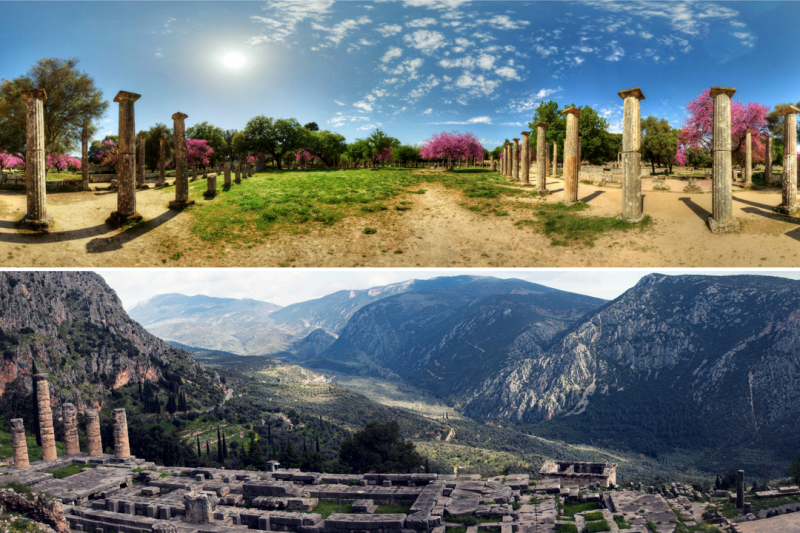List of Courses
- History of Ancient and Modern Olympic Games
- Sacred Cities of Ancient Greece
- The Art of Ceramics in Ancient Greece
- Alexander the Great & the Hellenistic Age
- The Minoan Civilization
- Cycladic Civilization
- Homeric Routes
- The Philosophical Quest
- Ancient Greek Drama
- Philosophy of Mathematics in Ancient Greece
History of Ancient and Modern Olympic Games
Join us on this journey to explore the history of the Olympic Games and the role of diet and sports in classical Antiquity. This 10-day interdisciplinary course uses in-class seminars and archeologist-led visits to sites and museums in Athens, Ancient Olympia, Nemea and elsewhere to explore topics such as the Mediterranean diet in Ancient and Modern Greece, sanctuaries and the Games, and the history of the modern Olympics.
Sacred Cities of Ancient Greece
This course explores religion and philosophy in Classical Antiquity through the prism of the sacred cities of Ancient Greece: Athens, Delphi, Eleusis, Olympia and the island of Delos. This travel route explores topics such as “Classical Antiquity & the Politics of America”, “Art, Philosophy and Religion in Ancient Greece”.
The Art of Ceramics in Ancient Greece
Pottery is the most common artefact found during archaeological excavations, collectively providing an open window into the past. This course uses the history of ceramics as a means to examine cultural relations, beliefs and practices of Antiquity and to explore issues of iconography and the anthropology of art. On-site sessions include visits to Corinth, Eleusis, Thebes, Nafplio and the islands of Poros and Aegina.
Alexander the Great & the Hellenistic Age
Join us for a panoramic view of Alexander the Great’s life and legacy. You will gain an understanding of Alexander’s military accomplishments and territorial expansion and the processes by which Greek culture and language were disseminated throughout the empire. The route includes the breathtaking scenery of Mt. Olympus, archaeologist-led sessions at the Archaeological Museums of Thessaloniki and Vergina (the burial site of the kings of Macedonia) and visits to UNESCO World Heritage Sites such as the city of Aigai and the archaeological site of Philippi.
The Minoan Civilization
This course explores Minoan society through its art, architecture, mythology, and material culture. At the same time, it investigates the role of the Minoan palaces on the development of administration and trade in the region, and the influence Minoan culture had on shaping the foundations of European civilization. The 10-day journey includes on-site sessions at various Minoan settlements, including the palaces of Knossos, Phaistos, Malia, and Zakros.
Cycladic Civilization
This intriguing interdisciplinary course weaves together topics in maritime archaeology, the art of sculpture and travel in the ancient world as it explores the culture and commerce of Cycladic civilization (3200-2300 BCE). In addition to exploring the rich collections of Cycladic sculpture in Athens, the route brings you to the islands of Milos and Tinos, as well as Santorini, where you’ll visit the live dig at Akrotiri in Santorini (the so-called ‘Pompeii’ of the Aegean), with its ongoing excavations of what is considered one of the most important prehistoric settlements in the Eastern Mediterranean.
Homeric Routes
Follow us on a journey along Ηomeric routes, as we uncover the lives and mysteries of the Mycenaean civilization and delve into the work and legacy of the great epic poet. The route takes us from Athens to Sparta along the path of cities such as Mycenae and Nafplio to the mountains of the Peloponnese. The course covers topics such as “The World of Homer”, “War and Peace: the Mycenaean Civilization” and “People and Places: the Mycenaean Landscapes”.
The Philosophical Quest
This 10-day course provides an introduction to Greek philosophy and rhetoric through an exploration of important sites in the history of Greek philosophy- Athens and Eleusis, and the islands of Kos and Rhodes. The 10-day journey tales us from the ancient ruins where Plato and Aristotle once taught to the site of the Eleusinian Mysteries, and from there to the island of Rhodes and onward to Kos and the Asklepieion, the renowned healing center of Classical Antiquity.
The Origins of the Theatre: Ancient Greek Drama
To the Ancient Greeks, the theatre was a form of amusement taken very seriously. The acclaimed plays of great dramatists, such as Aeschylus, Sophocles, Euripides and Aristophanes, which formed the foundation of modern theatre, not only entertained their spectators, but also indirectly disseminated among the audience the values of democracy, justice, belief in the gods and in the city’s time-honored institutions. This 10-day course explores the fundamentals of Ancient Greek Drama, investigating topics such as the relationship between Platonic philosophy and acting, the role of the chorus in ancient drama, and anthropology and theater. In addition to the museums and ancient theaters in Athens, site visits include Eleusis, Delphi, and Epidaurus.
Philosophy of Mathematics in Ancient Greece
This interdisciplinary course looks at the interrelations of mathematics and philosophical thinking, exploring topics such as Plato and Platonism in mathematical philosophy, continuity and infinity in Aristotelian philosophy, and Pythagorean thought. Route highlights include Ancient Corinth, Nafplio, and Epidaurus.

